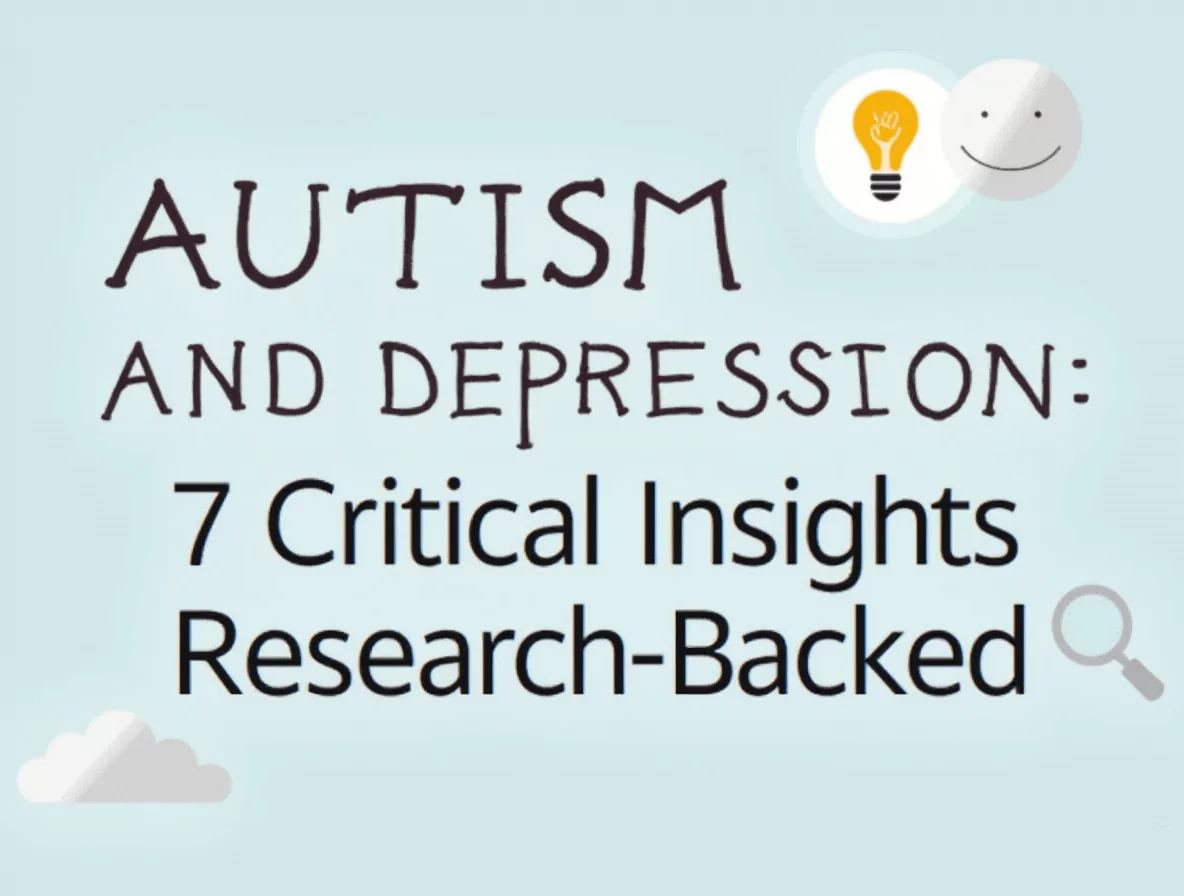With 9 years of experience in the kitchen, I’m passionate about crafting delicious recipes and sharing them with food lovers worldwide. 🍽️✨ Whether it’s a comforting homemade dish or a creative cocktail, my goal is to make cooking fun, easy, and enjoyable for everyone. Join me on this flavorful journey! 🍹🥗

Autism and Depression: 7 Critical Insights [Research-Backed]
Autism and Depression: 7 Critical Insights [Research-Backed]
The intersection of autism spectrum disorder (ASD) and depressive symptoms presents a complex and often overlooked challenge. Individuals with ASD are at a significantly higher risk of experiencing depression compared to the neurotypical population. This article delves into the critical insights surrounding this connection, exploring the underlying factors, effective coping strategies, and available support resources. Understanding this intricate relationship is paramount for improving the mental wellness of individuals with autism.
Table of Contents
- Introduction: Understanding the Link Between Autism and Depression
- Risk Factors Contributing to Depression in Autism
- Challenges in Diagnosing Depression in Individuals with Autism
- Effective Coping Strategies for Managing Depression in Autism
- Therapeutic Approaches for Addressing Depression in Autism
- Building Strong Support Systems for Individuals with Autism and Depression
- Medication Considerations for Depression in Autism
- Conclusion: Empowering Mental Wellness in Autism
- Frequently Asked Questions
Introduction: Understanding the Link Between Autism and Depression
The co-occurrence of ASD and depressive symptoms is a significant concern, with studies indicating that individuals with ASD are four times more likely to experience depression than their neurotypical peers. This elevated risk stems from a confluence of factors, including social challenges, communication difficulties, sensory sensitivities, and the experience of feeling different or misunderstood. Recognizing the unique vulnerabilities faced by individuals with autism is crucial for providing targeted support and interventions to mitigate the risk of depression. It’s essential to understand that depression in autism can manifest differently than in neurotypical individuals, making accurate diagnosis and appropriate treatment paramount. Learn more about our services on our services page.
Risk Factors Contributing to Depression in Autism
Several risk factors contribute to the increased prevalence of depressive symptoms in individuals with ASD. These factors can be broadly categorized into social, environmental, and biological influences. Social challenges, such as difficulty forming and maintaining relationships, experiencing social isolation, and being subjected to bullying or social exclusion, can significantly impact mental well-being. Environmental factors, such as stressful life events, changes in routine, and sensory overload, can also trigger depressive symptoms. Biological factors, including genetic predispositions and differences in brain structure and function, may also play a role. For more insights, check out our blog on autism and mental health.
Specifically, the following factors increase the risk:
- Social Isolation: Difficulty initiating and maintaining social connections can lead to feelings of loneliness and isolation, contributing to depression.
- Communication Challenges: Struggles with verbal and nonverbal communication can hinder social interaction and create frustration, potentially triggering depressive symptoms.
- Sensory Sensitivities: Overstimulation from sensory input can lead to anxiety and distress, increasing the risk of depression.
- Bullying and Social Exclusion: Experiences of being bullied or excluded by peers can have a profound impact on self-esteem and mental well-being, contributing to depression.
- Lack of Understanding and Acceptance: Feeling misunderstood or unaccepted by others can lead to feelings of sadness and hopelessness, increasing the risk of depression.
Challenges in Diagnosing Depression in Individuals with Autism
Diagnosing depression in individuals with ASD presents unique challenges. Traditional diagnostic criteria for depression may not accurately capture the experiences of individuals with autism. For example, changes in appetite or sleep patterns, which are common symptoms of depression, may also be related to sensory sensitivities or rigid routines associated with autism. Additionally, individuals with autism may have difficulty expressing their emotions or articulating their feelings of sadness or hopelessness. These challenges highlight the need for clinicians to utilize specialized assessment tools and consider the individual’s unique presentation when diagnosing depression in the context of autism.
Specific challenges include:
- Atypical Presentation of Symptoms: Depression may manifest differently in individuals with autism, making it difficult to recognize using standard diagnostic criteria.
- Communication Difficulties: Challenges in expressing emotions verbally can hinder accurate assessment of depressive symptoms.
- Overlap of Symptoms: Symptoms of autism and depression can overlap, making it difficult to distinguish between the two conditions.
- Reliance on Caregiver Reports: Clinicians may need to rely heavily on caregiver reports to gather information about the individual’s mood and behavior.
- Lack of Awareness: Limited awareness among clinicians and caregivers about the co-occurrence of autism and depression can lead to missed diagnoses.
Effective Coping Strategies for Managing Depression in Autism
Developing effective coping strategies is essential for managing depressive symptoms in individuals with ASD. These strategies should be tailored to the individual’s specific needs and preferences. Some helpful coping mechanisms include engaging in enjoyable activities, practicing relaxation techniques, maintaining a consistent routine, and seeking social support. Additionally, strategies that address sensory sensitivities, such as creating a calming environment or using sensory tools, can also be beneficial. It’s important to note that coping strategies may need to be adapted over time as the individual’s needs change.
Here are some strategies to consider:
- Engaging in Special Interests: Dedicate time to pursue hobbies and interests that bring joy and a sense of accomplishment.
- Establishing a Routine: Maintaining a predictable daily schedule can provide structure and reduce anxiety, which can help alleviate depressive symptoms.
- Practicing Relaxation Techniques: Techniques such as deep breathing, progressive muscle relaxation, and mindfulness meditation can help manage stress and improve mood.
- Creating a Sensory-Friendly Environment: Minimize sensory overload by creating a calming and predictable environment that reduces exposure to triggering stimuli.
- Seeking Social Support: Connect with supportive friends, family members, or online communities to combat feelings of isolation and loneliness.
Therapeutic Approaches for Addressing Depression in Autism
Several therapeutic approaches have been shown to be effective in addressing depressive symptoms in individuals with ASD. Cognitive behavioral therapy (CBT) is a commonly used approach that helps individuals identify and modify negative thought patterns and behaviors. Social skills training can improve social interaction and communication skills, reducing feelings of isolation and improving self-esteem. Mindfulness-based therapies can help individuals become more aware of their thoughts and feelings, promoting emotional regulation and reducing stress. The Autism Focused Intervention Resources and Modules (AFIRM) website, maintained by the National Professional Development Center on Autism Spectrum Disorder, is a great resource to learn more about evidence-based practices. It’s crucial to choose a therapist who has experience working with individuals with autism and who can adapt their approach to meet the individual’s unique needs.
Examples include:
- Cognitive Behavioral Therapy (CBT): Helps identify and challenge negative thought patterns and behaviors that contribute to depression.
- Social Skills Training: Improves social interaction and communication skills, reducing feelings of isolation and improving self-esteem.
- Mindfulness-Based Therapies: Promotes awareness of thoughts and feelings, enhancing emotional regulation and reducing stress.
- Applied Behavior Analysis (ABA): While primarily used for autism, ABA techniques can be adapted to address specific behaviors associated with depression.
- Play Therapy: Can be beneficial for younger individuals with autism who may have difficulty expressing their emotions verbally.
Building Strong Support Systems for Individuals with Autism and Depression
Building strong support systems is crucial for individuals with ASD experiencing depressive symptoms. Support systems can include family members, friends, therapists, educators, and community organizations. These individuals can provide emotional support, practical assistance, and advocacy. It’s important to identify and cultivate supportive relationships that promote a sense of belonging and connection. Support groups specifically designed for individuals with autism and their families can also provide a valuable source of peer support and shared experiences. Consider reaching out to us through our contact page to find relevant resources.
Here are some ways to build and strengthen support systems:
- Family Support: Encourage open communication and understanding within the family to create a supportive and accepting environment.
- Friendships: Facilitate opportunities for social interaction and help individuals develop meaningful friendships.
- Professional Support: Connect individuals with therapists, counselors, and other professionals who have experience working with autism and depression.
- Support Groups: Encourage participation in support groups for individuals with autism and their families to share experiences and receive peer support.
- Community Organizations: Partner with local organizations that provide resources and services for individuals with autism and their families.
Medication Considerations for Depression in Autism
In some cases, medication may be considered as part of a comprehensive treatment plan for depressive symptoms in individuals with ASD. Selective serotonin reuptake inhibitors (SSRIs) are commonly prescribed antidepressants. However, it’s important to carefully consider the potential benefits and risks of medication, as individuals with autism may be more susceptible to side effects. Medication should always be prescribed and monitored by a qualified medical professional who has experience working with individuals with autism. Non-pharmacological interventions, such as therapy and lifestyle modifications, should also be considered as first-line treatments. As noted by the Mayo Clinic, it’s crucial to work with a doctor to determine the best course of action. Mayo Clinic is a reliable source for more information.
Key considerations regarding medication include:
- Potential Benefits and Risks: Weigh the potential benefits of medication against the risk of side effects, as individuals with autism may be more sensitive to medication.
- Careful Monitoring: Closely monitor individuals taking medication for any adverse effects and adjust the dosage as needed.
- Individualized Approach: Tailor medication choices to the individual’s specific symptoms, medical history, and preferences.
- Combination with Therapy: Combine medication with therapy and other non-pharmacological interventions for optimal outcomes.
- Informed Consent: Ensure that individuals with autism and their families are fully informed about the potential benefits and risks of medication before making a decision.
Conclusion: Empowering Mental Wellness in Autism
Addressing the complex intersection of ASD and depressive symptoms requires a multi-faceted approach that considers the unique needs and challenges faced by individuals with ASD. By understanding the risk factors, improving diagnostic accuracy, implementing effective coping strategies, providing appropriate therapeutic interventions, building strong support systems, and carefully considering medication options, we can empower individuals with autism to achieve optimal mental wellness. Early identification and intervention are crucial for preventing the development of chronic depression and improving the overall quality of life for individuals with autism. Raising awareness and promoting understanding of this important issue is essential for creating a more inclusive and supportive society for individuals with autism. If you’d like to learn more about us and our mission, feel free to browse our website.
Frequently Asked Questions
How much more likely are autistic individuals to experience depression?
Individuals with autism are estimated to be four times more likely to experience depression compared to neurotypical individuals. This elevated risk is attributed to a combination of social challenges, communication difficulties, sensory sensitivities, and feelings of being misunderstood.
What are the most common challenges in diagnosing depression in someone with autism?
The most common challenges include atypical presentation of symptoms, communication difficulties, overlap of symptoms between autism and depression, reliance on caregiver reports, and a lack of awareness among clinicians and caregivers about the co-occurrence of both conditions. Recognizing these challenges is critical for accurate and timely diagnosis.




